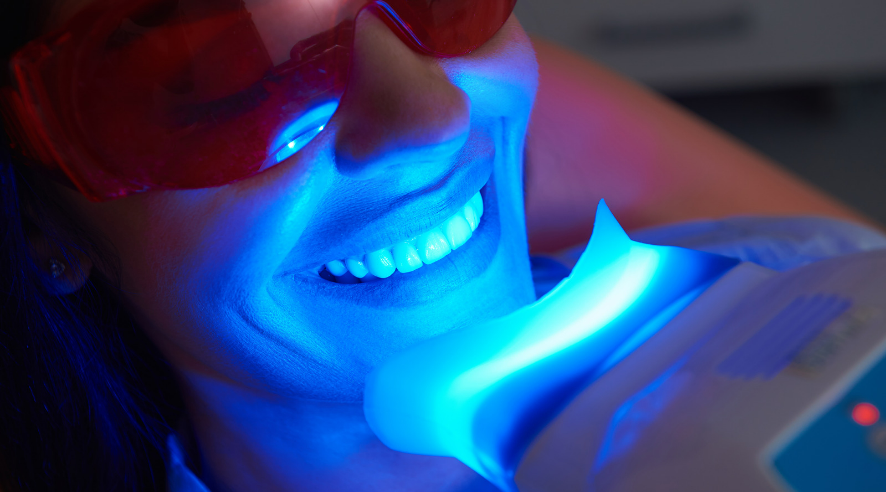Whiter Teeth, Brighter Smile: Tips and Tricks for Effective Teeth Whitening
- 11 October 2022

A bright, healthy smile is a great asset to have. It makes you look more attractive, confident, and approachable. But as we age or expose our teeth to certain foods, drinks, and habits, they tend to lose their natural whiteness and become stained or discolored. Luckily, there are many ways to whiten your teeth, from natural remedies to professional treatments. In this article, we will share some of the best tips and tricks for effective teeth whitening.
Understanding Teeth Discoloration
Before we dive into the methods of teeth whitening, it's important to understand why our teeth become discolored in the first place. There are many factors that can contribute to teeth staining or discoloration, such as:
- Poor oral hygiene: if you don't brush and floss regularly, plaque and tartar can build up on your teeth and make them look yellow or brownish.
Smoking: tobacco contains tar and nicotine that can leave stains on your teeth, as well as increase your risk of gum disease and oral cancer. - Food and drinks: certain foods and drinks, such as coffee, tea, wine, soda, and berries, contain pigments that can adhere to the enamel of your teeth and cause discoloration.
- Medications: some medications, such as antibiotics, antihistamines, and chemotherapy drugs, can cause teeth staining or discoloration as a side effect.
By knowing the causes of your teeth discoloration, you can choose the most appropriate method of teeth whitening that suits your needs and preferences.
Natural Remedies for Teeth Whitening
If you prefer a more natural and affordable way to whiten your teeth, you can try some of these home remedies:
- Baking soda and hydrogen peroxide: mix a small amount of baking soda with hydrogen peroxide to form a paste, then brush your teeth with it for 1-2 minutes, rinse and spit. Baking soda can help remove surface stains, while hydrogen peroxide has antibacterial properties that can reduce plaque and bacteria in your mouth.
- Coconut oil pulling: swish a tablespoon of coconut oil in your mouth for 10-20 minutes, then spit it out and rinse your mouth with water. Coconut oil can help remove toxins and bacteria from your mouth and freshen your breath, although its effectiveness in whitening teeth is not scientifically proven.
- Apple cider vinegar rinse: mix 2 teaspoons of apple cider vinegar with 6 ounces of water, swish it in your mouth for 30 seconds, then spit it out and rinse your mouth with water. Apple cider vinegar can act as a natural disinfectant and whitener, but it can also erode your enamel if used too frequently or in high concentration.
These natural remedies can be used as a supplement to your regular oral hygiene routine, but they may not provide immediate or dramatic results.
Over-the-Counter Teeth Whitening Products
If you want a more convenient and faster way to whiten your teeth, you can opt for over-the-counter teeth whitening products that are widely available in drugstores and online. Some of the most popular types of teeth whitening products are:
- Whitening toothpaste: these toothpastes contain mild abrasives and/or bleaching agents that can remove surface stains and whiten teeth over time. However, their effectiveness may vary depending on the type and severity of your teeth discoloration.
- Whitening strips: these thin, flexible strips are coated with a peroxide-based gel that adheres to your teeth and breaks down stains. You need to apply the strips for a certain period of time (usually 30 minutes to 1 hour) once or twice a day for a week or two to see noticeable results.
- Whitening trays: these custom-fit trays are filled with a peroxide-based gel that you wear over your teeth for a certain period of time (usually 30 minutes to several hours) daily or overnight. They can provide more consistent and thorough whitening than strips, but may cause more sensitivity or discomfort if not used correctly.
- Whitening pens: these portable pens contain a peroxide-based gel that you brush onto your teeth and let it dry for a few minutes. They are easy to use and can be carried in your purse or pocket, but may not cover all the teeth or provide long-lasting results.
When choosing an over-the-counter teeth whitening product, make sure to read the instructions carefully, follow the recommended dosage and frequency, and check the ingredients for safety and efficacy. You may also want to consult with your dentist or hygienist for advice on which product suits your teeth and goals.
Professional Teeth Whitening Treatments
If you want the fastest and most dramatic results, or if your teeth discoloration is severe or resistant to other methods, you may consider professional teeth whitening treatments that are performed by a dentist or hygienist. Some of the most common types of professional teeth whitening treatments are:
- In-office bleaching: this procedure involves applying a high-concentration peroxide gel to your teeth and activating it with a special light or heat source. It can whiten your teeth up to several shades in just one visit, but may cause more sensitivity or discomfort than other methods.
- Take-home trays: your dentist can also provide you with custom-fit trays and a lower-concentration peroxide gel that you can wear at home for a certain period of time (usually a few weeks). This method is less intense than in-office bleaching but can provide similar results with less risk of side effects.
- Laser or plasma arc whitening: this high-tech method uses a laser or plasma arc to activate the peroxide gel and penetrate deeper into the teeth, resulting in faster and more effective whitening. However, it may also be more expensive and time-consuming than other methods.
Professional teeth whitening treatments are generally safe and effective, but may not be suitable for everyone, especially if you have existing dental problems or allergies. You should also be prepared for the costs and the maintenance needed to preserve the results.
Teeth whitening is a popular and effective way to enhance your smile and boost your confidence. Whether you prefer natural remedies, over-the-counter products, or professional treatments, there are many options to choose from. However, you should also be aware of the risks, limitations, and costs associated with each method, and consult with your dentist or hygienist if you have any concerns or questions. With the right approach and persistence, you can achieve whiter teeth and brighter smile that you deserve.




